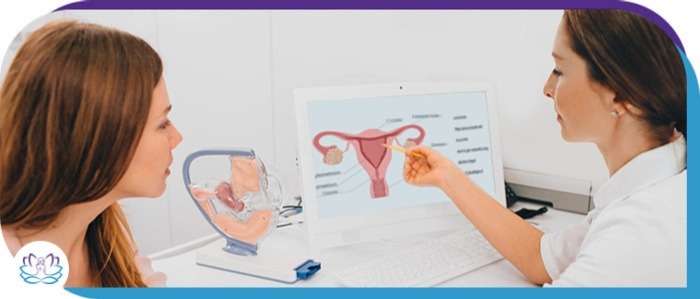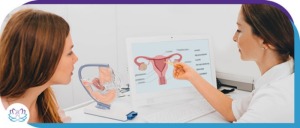What Are the Symptoms of Polycystic Ovary Syndrome (PCOS)?
PCOS is a hormonal disorder common among women of reproductive age, with causes including hormonal imbalances, and genetics. Symptoms may include irregular menstrual cycles, acne, excess hair growth, weight gain, and fertility issues. Visit Dr. Michelle Trandai, for PCOS treatment, we provide personalized approaches tailored to manage symptoms such as irregular periods, excess hair growth, and fertility concerns, ensuring optimal health and well-being. Consult Dr. Michelle Trandai MD, and her team for effectively managing PCOS. For more information, contact us or request an appointment online. We are located at 5449 N Broadway, Chicago, IL 60640.


Table of Contents:
What triggers PCOS?
What are the stages of PCOS?
What does PCOS pain feel like?
How is PCOS treated?
PCOS (polycystic ovary syndrome) is a hormonal disorder that affects those assigned female at birth as it causes the development of small cysts among the ovaries, leading to hormonal imbalances.
There are a variety of factors that can trigger PCOS as well as contribute to the development of the condition, specifically genetic and environmental factors. These factors typically include hormonal imbalances, an overproduction of androgens (male hormones), and an increased resistance to insulin. Research has also shown that some lifestyle factors can contribute to exacerbating or triggering the symptoms of PCOS, including maintaining a poor, unbalanced diet, being relatively sedentary, and regularly having high levels of stress. Little is still understood about PCOS, so there are no clear definitive causes for PCOS or flare-ups of symptoms. As well, every patient will experience PCOS differently, so what may be a trigger for one patient may be completely irrelevant to another. To properly manage the condition, patients are encouraged to work with their healthcare provider to determine their likely triggers that exacerbate symptoms as well as to find treatment options that work well for them.
There are no distinct stages or types of PCOS, but there are a variety of symptoms that may be experienced by affected patients, with some patients having more severe symptoms than others. Some patients only have a very mind form of the condition, many of which may not even be aware that they have PCOS, whereas many patients have symptoms that are so severe that the condition is directly affecting their quality of life as well as their ability to conceive. The severity of the condition is typically determined based on the severity of the symptoms and what kind of symptoms are being experienced, as they can vary from oily skin to infertility. It is common for the symptoms experienced in those with PCOS to improve after menopause due to the androgen levels decreasing once the ovaries have ceased to function.
Pain is a common symptom of PCOS, but it can vary quite a bit from person to person, ranging in severity and sensation. Some patients may experience the pain as discomfort in their lower abdomen or pelvis and may be described as dull, achy, or sharp, ranging from mild to severe. It is also common for patients to experience worsened pain symptoms during their menstrual cycle or while they are ovulating.
Not all symptoms of PCOS are strictly pain-related, although the symptoms that do cause pain tend to be among the more severe symptoms and are likely to interfere with the individual’s quality of life more than other common symptoms. Other common symptoms of PCOS include thinning hair, balding, darkening of the skin, skin tags, irregular periods, excess body hair growth, acne, oily skin, weight gain, and increased difficulty getting pregnant or infertility.
Since PCOS can vary so much among individuals in symptoms, severity, and triggers, several different treatment options are available, with a combination of lifestyle changes and medical treatments often being the best course of treatment to properly manage the condition. Depending on the specific needs and triggers of the patient, lifestyle changes that may be implemented to help manage PCOS symptoms include regular exercise and a balanced diet to help the individual manage a healthy weight. Some medical interventions that may be recommended include birth control pills or other forms of hormonal contraception to help regulate the individual’s menstrual cycle and reduce symptoms that are caused by hormonal imbalances such as acne and excess hair growth. Insulin resistance is another common symptom of PCOS, making medications such as metformin a good treatment option in those cases. Patients with PCOS who are trying to conceive may be provided with fertility treatments to help increase the chances of them becoming pregnant. There is no current cure for PCOS, but the condition can be effectively managed through a variety of treatment options that are chosen to fit the unique needs of each patient. When developing a treatment and management plan, patients can work with their healthcare provider to determine which options would be appropriate to implement into their treatment plan to ensure that they are safe and effective.
Visit Dr. Michelle Trandai, MD, OBGYN, for personalized PCOS treatment options. We provide comprehensive care to help you manage your condition effectively. Contact us today to schedule a consultation and take the first step towards managing PCOS effectively. For more information, contact us or request an appointment online. We are located at 5449 N. Broadway, Chicago, IL 60640. We serve patients from Chicago IL, Evanston IL, Ravenswood IL, Uptown IL, Lake View IL, Lincoln Park IL, Buena Park IL, Bowmanville IL, Boystown IL, and Roscoe Village, IL.






